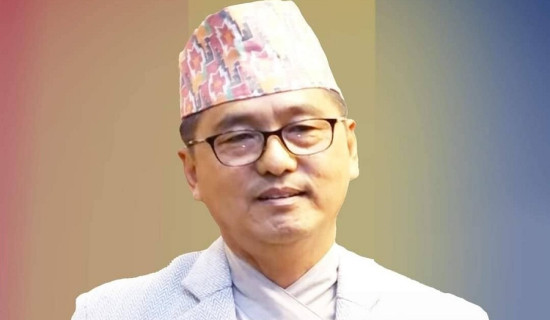- Saturday, 27 December 2025
Gold Scam Heats Up Politics
With several scams and scandals gripping the nation, our law enforcement agencies have come under increased public scrutiny, as doubts cloud over their ability to bring real wrongdoers to justice due to the latter’s alleged connection with influential individuals. The investigating agency, the Nepal Police's Central Investigation Bureau (CIB), which carries out investigations into organised crimes, has discovered a network of smugglers with ties to a few powerful personalities here. According to reports, these smugglers brought in quintals after quintals of gold before reshaping the precious yellow metal in covert Kathmandu locations in order to enable gold smuggling into India.
The ruling and opposition parties have clashed over the gold smuggling scam, blaming one other for such scams as names of some politicians have prominently featured in connection with the gold incident. Recently, CPN-Maoist Centre vice chairman Krishna Bahadur Mahara and his sons were implicated in a gold smuggling case in which nine kilogrammes of gold were concealed within e-cigarettes and brought into the country through Kathmandu's international airport. Mahara and his sons allegedly participated in phone calls umpteenth times with Chinese nationals suspected of orchestrating the gold smuggling in Nepal.
Political pressure
Initially, the group of gold smugglers, which included a considerable number of Chinese and Indian nationals as well as some Nepalis, operated freely until their operations were exposed. The dismantling of smuggling operations has shown the involvement of some leaders and officials assisting smugglers in different ways. However, due to various influences, the CIB is said to be in difficulty bringing the involved individuals to justice in time. As the gold fraud problem increased, political pressure played a part in selectively arresting some while allowing others to avoid punishment.
For example, a Nepali Congress member who is also a physician was caught after demanding the resignation of the Home Minister and Finance Minister for failing to stop the rampant gold smuggling. He was arrested on suspicion of carrying counterfeit educational certificates; however, he was eventually released by the court. Following this arrest and release, the Home Minister met with the President of the Nepali Congress to discuss the latter's displeasure with the detention of their parliamentarian. Many Congress members chastised the Maoist Centre for targeting their MPs, who belong to the government coalition's largest party.
This episode, together with the arrest of Bal Krishna Khand, a senior Congress politician, in connection with the Bhutanese refugee fraud, has raised concerns among NC leaders who are concerned about what they consider to be a bias in arrests, with certain Congress and opposition officials arrested and jailed while several Maoist leaders reportedly implicated in various scandals remain unharmed. Given the gravity of the gold smuggling issue and its potential political repercussions, the opposition party, the CPN-UML, has urged the formation of a high-level committee to investigate the smuggling and alleged link of leaders to smugglers, which the government has categorically opposed. The main opposition's legislators have been disrupting parliamentary sessions for the purpose.
While bringing the House to a halt over the gold scam, the opposition party has drawn flak for creating impediments regarding the discussion and endorsement of several bills that have been tabled in the parliament. The opposition party has not yet budged from its demand, thus giving continuity to House obstruction. In the meantime, observers predict that the formation and empowerment of such a committee may cause concern among a handful of influential individuals while a few argue that such a body might affect the ongoing CIB investigation, hence sabotaging the outcome. Meanwhile, some Congress lawmakers who are considered party dissidents have called for the formation of a high-level body to probe into gold smuggling and smugglers' connections with powerful people.
It is widely assumed that the smuggling of significant gold quantities at the country's lone international airport, could not have occurred without coordination between people in positions of authority and customs officials. Following a considerable public uproar, the CIB was tasked with investigating the ongoing gold smuggling case and purportedly discovered a few high-profile persons with connections to the smugglers. Given the dedication of Home Minister Narayan Kaji Shrestha, there is optimism that the current investigation will reach a concrete conclusion and hold all involved people accountable. However, as evidenced by the current investigation, different factors, notably political ones, can dramatically impact the outcome of the probe.
Abuse of power
Without a doubt, the long sequence of scams and scandals has exposed the level of corruption deeply entrenched in our nation, posing a direct challenge to the ideals of good governance. Apart from undermining governmental transparency and accountability, such crimes and corruption encourage abuse of power for personal benefit, undermining the rule of law in society. They frequently give rise to criminal networks while eroding public trust in government and law enforcement agencies.
As gold smuggling heats up the nation's politics, the government must work collaboratively to eradicate all forms of organised crimes and scams. Meanwhile, the government must avoid making prejudiced decisions when investigating any scandal, smuggling case or fraud, as this could eventually be detrimental to the country’s political system. It is also imperative for the ruling and opposition parties to assist in investigating organisations in conducting fair and impartial probes so that criminals all hues and stripes can be exposed and held accountable.
(Upadhyay is former managing editor of this daily)

















